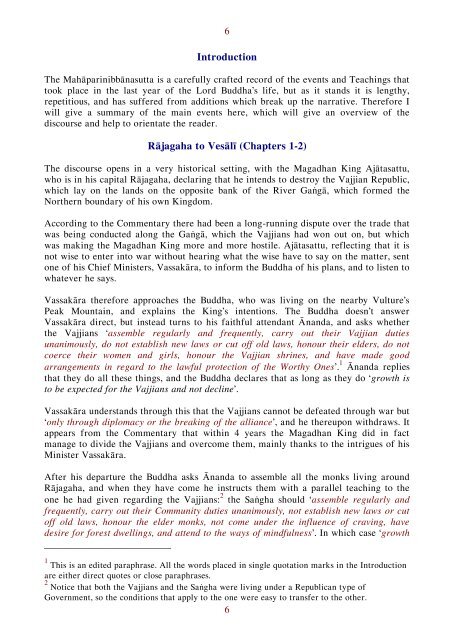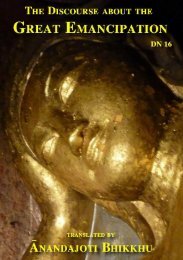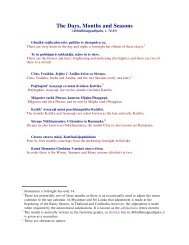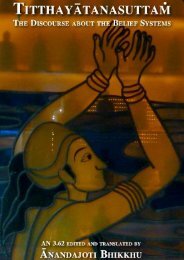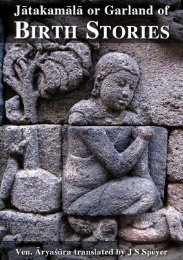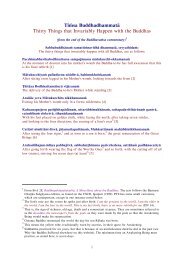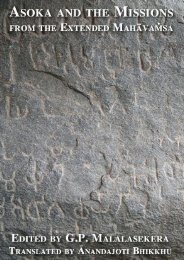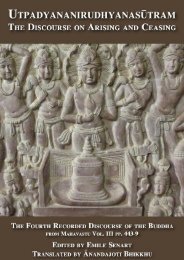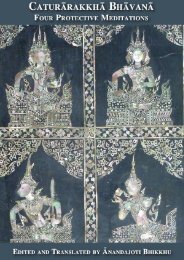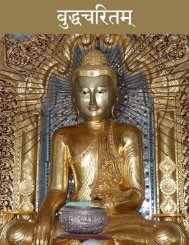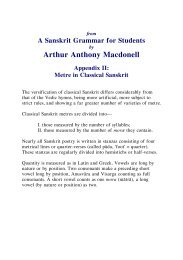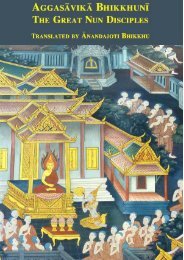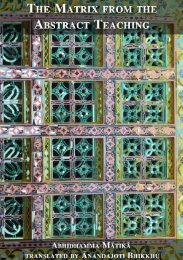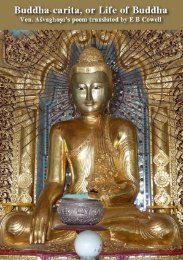Mahaparinibbanasuttam (DN 16) - Ancient Buddhist Texts
Mahaparinibbanasuttam (DN 16) - Ancient Buddhist Texts
Mahaparinibbanasuttam (DN 16) - Ancient Buddhist Texts
You also want an ePaper? Increase the reach of your titles
YUMPU automatically turns print PDFs into web optimized ePapers that Google loves.
6<br />
Introduction<br />
The Mahāparinibbānasutta is a carefully crafted record of the events and Teachings that<br />
took place in the last year of the Lord Buddha’s life, but as it stands it is lengthy,<br />
repetitious, and has suffered from additions which break up the narrative. Therefore I<br />
will give a summary of the main events here, which will give an overview of the<br />
discourse and help to orientate the reader.<br />
Rājagaha to Vesālī (Chapters 1-2)<br />
The discourse opens in a very historical setting, with the Magadhan King Ajātasattu,<br />
who is in his capital Rājagaha, declaring that he intends to destroy the Vajjian Republic,<br />
which lay on the lands on the opposite bank of the River Gaṅgā, which formed the<br />
Northern boundary of his own Kingdom.<br />
According to the Commentary there had been a long-running dispute over the trade that<br />
was being conducted along the Gaṅgā, which the Vajjians had won out on, but which<br />
was making the Magadhan King more and more hostile. Ajātasattu, reflecting that it is<br />
not wise to enter into war without hearing what the wise have to say on the matter, sent<br />
one of his Chief Ministers, Vassakāra, to inform the Buddha of his plans, and to listen to<br />
whatever he says.<br />
Vassakāra therefore approaches the Buddha, who was living on the nearby Vulture’s<br />
Peak Mountain, and explains the King’s intentions. The Buddha doesn’t answer<br />
Vassakāra direct, but instead turns to his faithful attendant Ānanda, and asks whether<br />
the Vajjians ‘assemble regularly and frequently, carry out their Vajjian duties<br />
unanimously, do not establish new laws or cut off old laws, honour their elders, do not<br />
coerce their women and girls, honour the Vajjian shrines, and have made good<br />
arrangements in regard to the lawful protection of the Worthy Ones’. 1 Ānanda replies<br />
that they do all these things, and the Buddha declares that as long as they do ‘growth is<br />
to be expected for the Vajjians and not decline’.<br />
Vassakāra understands through this that the Vajjians cannot be defeated through war but<br />
‘only through diplomacy or the breaking of the alliance’, and he thereupon withdraws. It<br />
appears from the Commentary that within 4 years the Magadhan King did in fact<br />
manage to divide the Vajjians and overcome them, mainly thanks to the intrigues of his<br />
Minister Vassakāra.<br />
After his departure the Buddha asks Ānanda to assemble all the monks living around<br />
Rājagaha, and when they have come he instructs them with a parallel teaching to the<br />
one he had given regarding the Vajjians: 2 the Saṅgha should ‘assemble regularly and<br />
frequently, carry out their Community duties unanimously, not establish new laws or cut<br />
off old laws, honour the elder monks, not come under the influence of craving, have<br />
desire for forest dwellings, and attend to the ways of mindfulness’. In which case ‘growth<br />
1 This is an edited paraphrase. All the words placed in single quotation marks in the Introduction<br />
are either direct quotes or close paraphrases.<br />
2 Notice that both the Vajjians and the Saṅgha were living under a Republican type of<br />
Government, so the conditions that apply to the one were easy to transfer to the other.<br />
6


